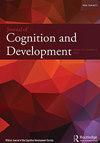瑞典学前教育工作者的数学焦虑及其与教学行为的关系
IF 2.1
2区 心理学
Q3 PSYCHOLOGY, DEVELOPMENTAL
引用次数: 0
摘要
研究人员通过一份问卷调查了儿童早期教育工作者的数学焦虑及其与教学行为频率的关系,352名参与者(年龄21-65岁)代表了瑞典市政当局进行了这项研究。我们的样本包含189名合格的幼儿教师和163名幼儿看护人,他们在数学教学焦虑方面的评分存在显著差异。结果显示,报告数学焦虑程度较高的合格幼儿园教师也报告说,教学和谈论数学内容的频率较低。当控制认证幼儿教师的性别和年龄,在幼儿园工作的年限,以及他们是否只与年龄较小的(1-3岁),年龄较大的(4-6岁)或两组儿童(1 - 6岁)一起工作时,认证幼儿教师的一般数学焦虑和数学教学焦虑预测了他们报告的数学教学频率以及在聚会中关于数字,模式和几何概念的谈话频率。为教学龄前儿童数学而设计的游览和情景。学龄前照顾者的数学焦虑测量和他们报告的教学行为频率没有显示统计学上显著的关系。研究结果显示,注册幼儿教师一般数学焦虑、数学教学焦虑和他们对数学内容的回避之间存在特定的关联,突出了幼儿教育者对数学焦虑的认识、数学焦虑的性质及其对教学实践的影响的重要性。本文章由计算机程序翻译,如有差异,请以英文原文为准。
Early Childhood Educators’ Math Anxiety and Its Relation to Their Pedagogic Actions in Swedish Preschools
Early childhood educators’ math anxiety and its relation to their frequency of pedagogic actions was examined through a questionnaire completed by 352 participants (aged 21–65) representative of the Swedish municipality where the study was conducted. Our sample contained 189 certified preschool teachers and 163 preschool caregivers who significantly differed in their ratings reported for math teaching anxiety. Results revealed that certified preschool teachers who reported higher levels of math anxiety also reported teaching and talking about mathematics content less frequently. When controlling for certified preschool teachers’ gender and age, years of work in preschools, and whether they work only with younger (1–3), older (4–6) or with both groups of children (1–6-year-old), certified preschool teachers’ general math anxiety and math teaching anxiety predicted their reported frequency of math teaching and frequency of conversations about numbers, patterns, and geometric concepts with peak strength in gatherings, excursions and situations designed to teach mathematics to preschool children. Preschool caregivers’ math anxiety measures and their reported frequency of pedagogic actions did not display statistically significant relations. Findings showed setting specific associations between certified preschool teachers general math anxiety, math teaching anxiety and their avoidance of mathematics content, highlighting the importance of early childhood educators’ awareness of math anxiety, its nature, and consequences for teaching practices.
求助全文
通过发布文献求助,成功后即可免费获取论文全文。
去求助
来源期刊

Journal of Cognition and Development
Multiple-
CiteScore
4.00
自引率
0.00%
发文量
29
期刊介绍:
The Journal of Cognition and Development is the official journal of the Cognitive Development Society (CDS). Some CDS members are concerned with basic research or theory; others focus on policy issues and practical applications. The range of interests includes cognitive development during all stages of life, and we seek to understand ontogenetic processes in both humans and nonhumans. Finally, their interests encompass typical as well as atypical development, and we attempt to characterize both biological and cultural influences on cognitive change and continuity.
 求助内容:
求助内容: 应助结果提醒方式:
应助结果提醒方式:


